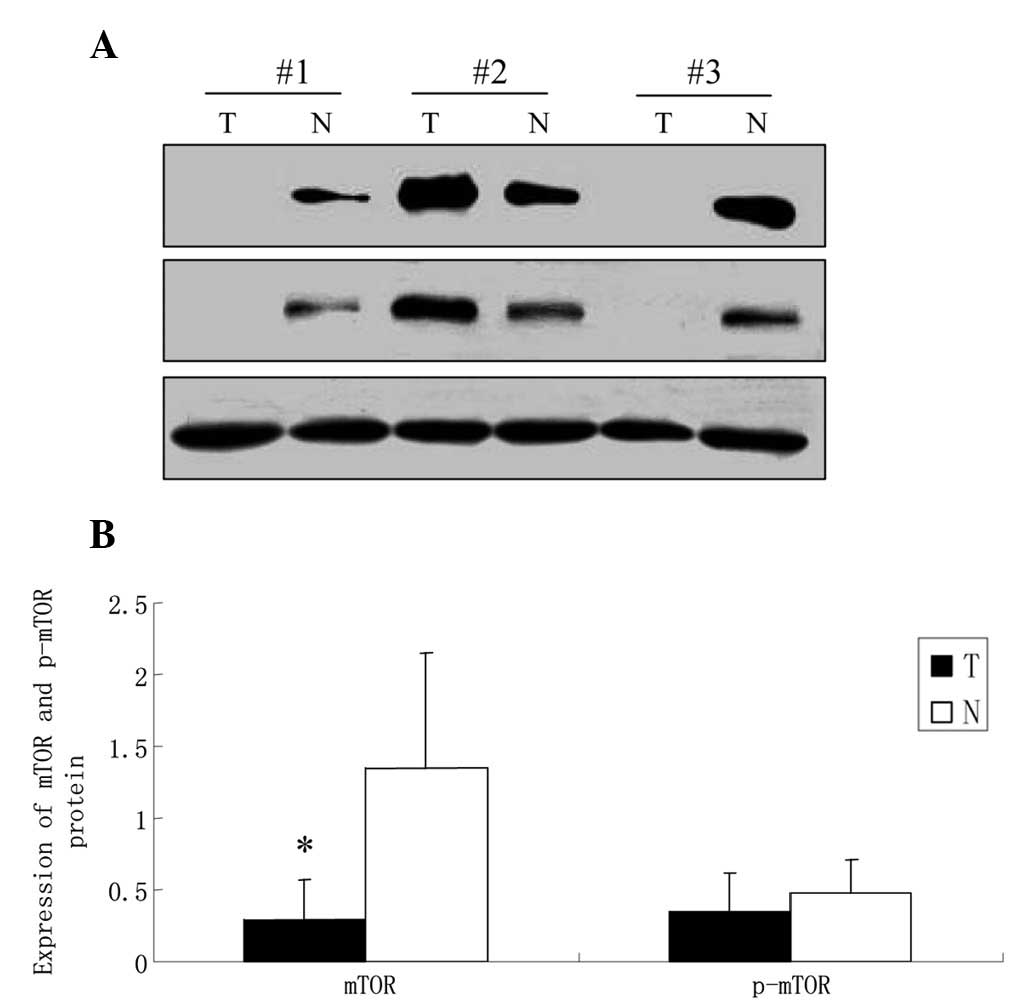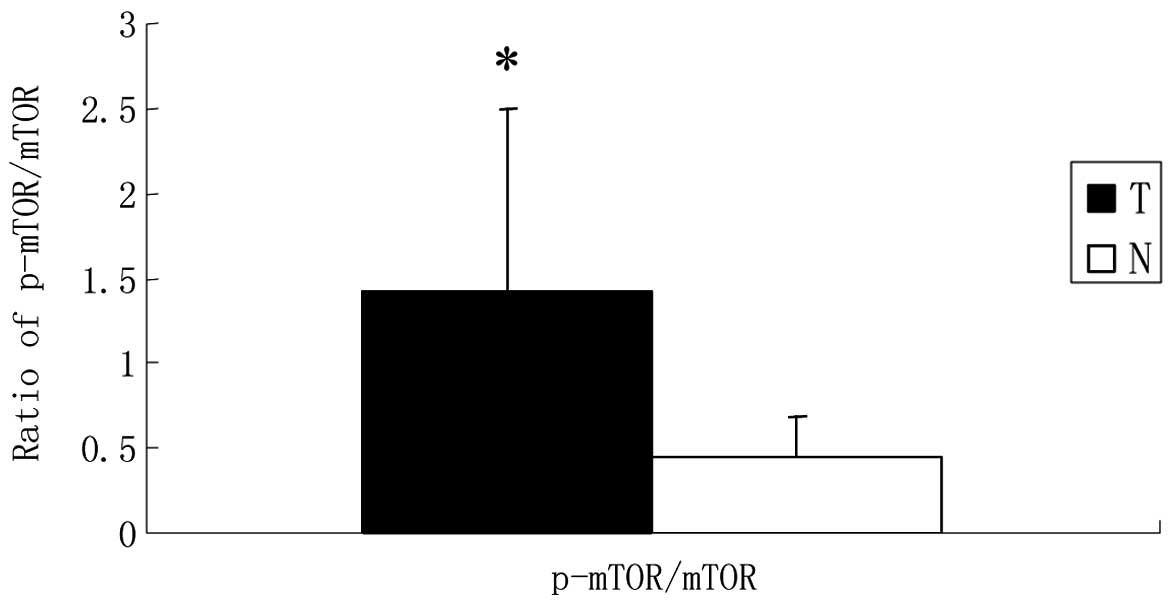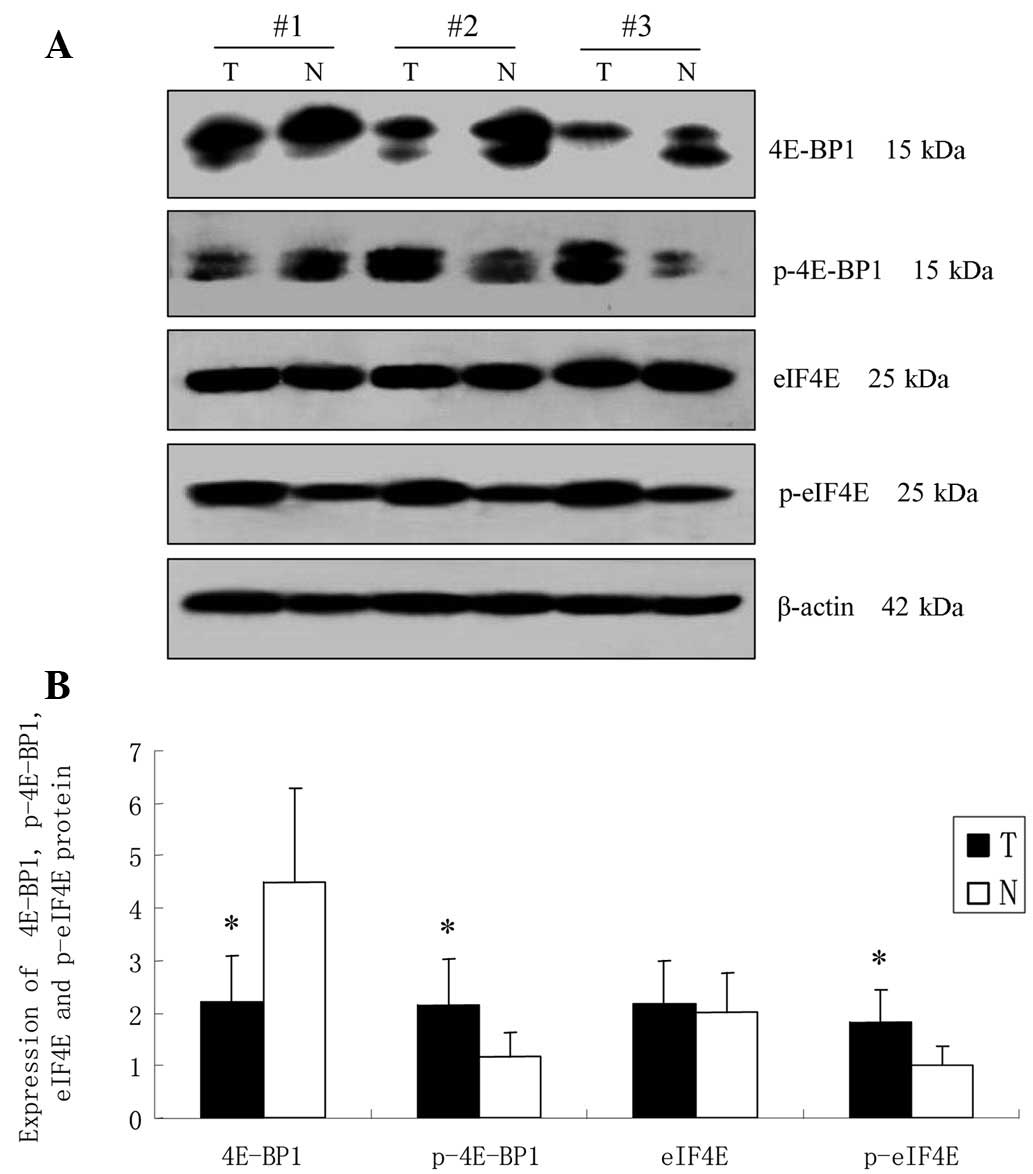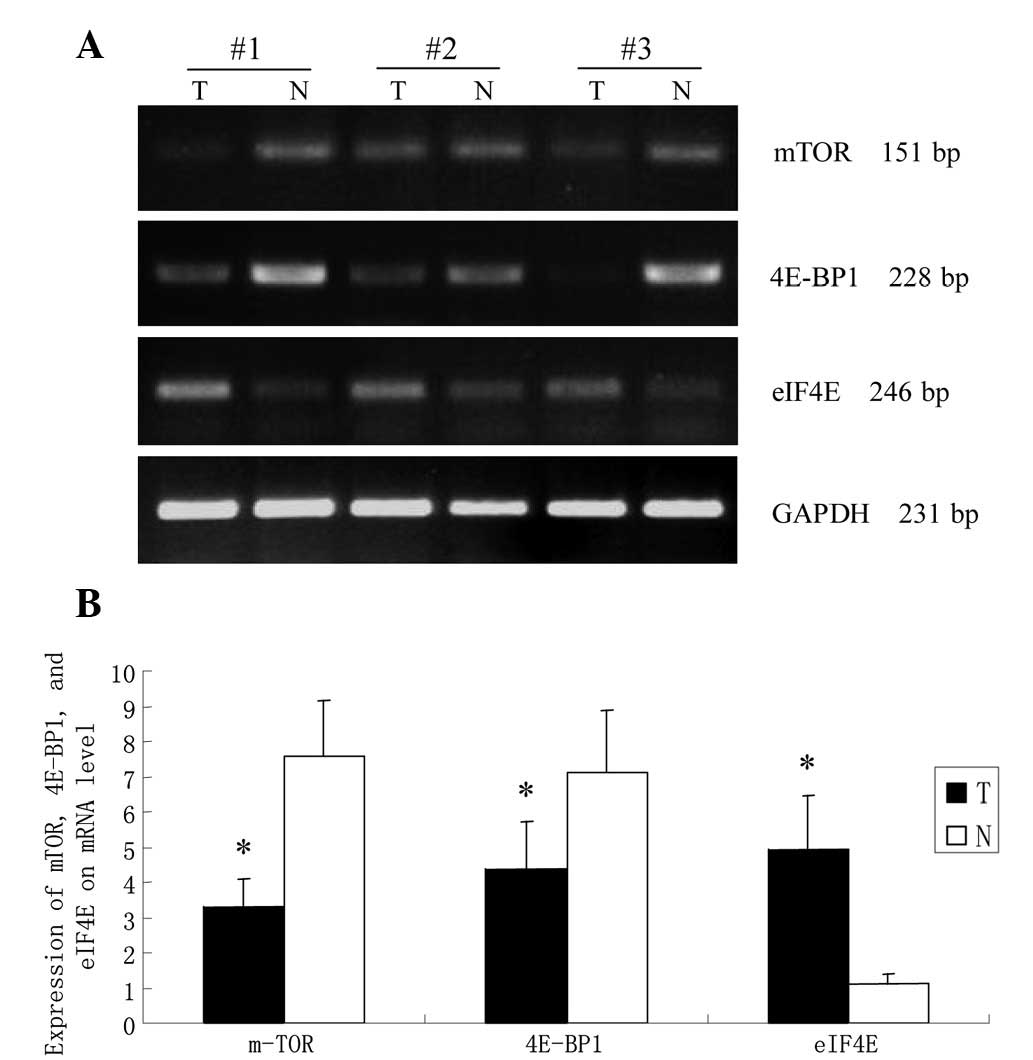|
1
|
Shah MA and Schwartz GK: Treatment of
metastatic esophagus and gastric cancer. Semin Oncol. 31:574–587.
2004. View Article : Google Scholar : PubMed/NCBI
|
|
2
|
Crane SJ, Richard Locke G III, Harmsen WS,
Diehl NN, Zinsmeister AR, Joseph Melton L III, et al: The changing
incidence of oesophageal and gastric adenocarcinoma by anatomic
sub-site. Aliment Pharmacol Ther. 25:447–453. 2007. View Article : Google Scholar : PubMed/NCBI
|
|
3
|
Zhao CY, Zhang XH, Xue LY, Xing LX, Wang
JL, Li XM, et al: Analysis of the changing trends of frequency and
localization of gastric cancers arising from different sites of the
stomach in population of the high incidence area of esophageal and
gastric cancers in Hebei province. Zhonghua Zhong Liu Za Zhi.
30:817–820. 2008.(In Chinese).
|
|
4
|
Tajima Y, Yamazaki K, Makino R, Nishino N,
Masuda Y, Aoki S, et al: Differences in the histological findings,
phenotypic marker expressions and genetic alterations between
adenocarcinoma of the gastric cardia and distal stomach. Br J
Cancer. 96:631–638. 2007. View Article : Google Scholar
|
|
5
|
Faried LS, Faried A, Kanuma T, Aoki H,
Sano T, Nakazato T, et al: Expression of an activated mammalian
target of rapamycin in adenocarcinoma of the cervix: A potential
biomarker and molecular target therapy. Mol Carcinog. 47:446–457.
2008. View
Article : Google Scholar : PubMed/NCBI
|
|
6
|
Albert JM, Kim KW, Cao C and Lu B:
Targeting the Akt/mammalian target of rapamycin pathway
for radiosensitization of breast cancer. Mol Cancer Ther.
5:1183–1189. 2006.
|
|
7
|
Mori H, Inoki K, Masutani K, Wakabayashi
Y, Komai K, Nakagawa R, et al: The mTOR pathway is highly activated
in diabetic nephropathy and rapamycin has a strong therapeutic
potential. Biochem Biophys Res Commun. 384:471–475. 2009.
View Article : Google Scholar : PubMed/NCBI
|
|
8
|
Fingar DC and Blenis J: Target of
rapamycin (TOR): an integrator of nutrient and growth factor
signals and coordinator of cell growth and cell cycle progression.
Oncogene. 23:3151–3171. 2004. View Article : Google Scholar : PubMed/NCBI
|
|
9
|
Fingar DC, Richardson CJ, Tee AR, Cheatham
L, Tsou C and Blenis J: mTOR controls cell cycle progression
through its cell growth effectors S6K1 and 4E-BP1/eukaryotic
translation initiation factor 4E. Mol Cell Biol. 24:200–216. 2004.
View Article : Google Scholar : PubMed/NCBI
|
|
10
|
Azar R, Alard A, Susini C, Bousquet C and
Pyronnet S: 4E-BP1 is a target of Smad4 essential for
TGFbeta-mediated inhibition of cell proliferation. EMBO J.
28:3514–3522. 2009. View Article : Google Scholar : PubMed/NCBI
|
|
11
|
Oulhen N, Mulner-Lorillon O and Cormier P:
eIF4E-binding proteins are differentially modified after ammonia
versus intracellular calcium activation of sea urchin unfertilized
eggs. Mol Reprod Dev. 77:83–91. 2010. View Article : Google Scholar : PubMed/NCBI
|
|
12
|
Lang SA, Gaumann A, Koehl GE, Seidel U,
Bataille F, Klein D, et al: Mammalian target of rapamycin is
activated in human gastric cancer and serves as a target for
therapy in an experimental model. Int J Cancer. 120:1803–1810.
2007. View Article : Google Scholar : PubMed/NCBI
|
|
13
|
Yoon DH, Ryu MH, Park YS, Lee HJ, Lee C,
Ryoo BY, et al: Phase II study of everolimus with biomarker
exploration in patients with advanced gastric cancer refractory to
chemotherapy including fluoropyrimidine and platinum. Br J Cancer.
106:1039–1044. 2012. View Article : Google Scholar : PubMed/NCBI
|
|
14
|
Siewert JR and Stein HJ: Classification of
adenocarcinoma of the oesophagogastric junction. Br J Surg.
85:1457–1459. 1998. View Article : Google Scholar : PubMed/NCBI
|
|
15
|
Johnson SM, Gulhati P, Rampy BA, Han Y,
Rychahou PG, Doan HQ, et al: Novel expression patterns of
PI3K/Akt/mTOR signaling pathway components in colorectal cancer. J
Am Coll Surg. 210:767–776. 2010. View Article : Google Scholar : PubMed/NCBI
|
|
16
|
Kruck S, Bedke J, Hennenlotter J, Ohneseit
PA, Kuehs U, Senger E, et al: Activation of mTOR in renal cell
carcinoma is due to increased phosphorylation rather than protein
overexpression. Oncol Rep. 23:159–163. 2010.PubMed/NCBI
|
|
17
|
Zhou X, Tan M, Stone Hawthorne V, Klos KS,
Lan KH, Yang Y, et al: Activation of the Akt/mammalian target of
rapamycin/4E-BP1 pathway by ErbB2 overexpression predicts tumor
progression in breast cancers. Clin Cancer Res. 10:6779–6788. 2004.
View Article : Google Scholar : PubMed/NCBI
|
|
18
|
Ji J and Zheng PS: Activation of mTOR
signaling pathway contributes to survival of cervical cancer cells.
Gynecol Oncol. 117:103–108. 2010. View Article : Google Scholar : PubMed/NCBI
|
|
19
|
Faivre S, Kroemer G and Raymond E: Current
development of mTOR inhibitors as anticancer agents. Nat Rev Drug
Discov. 5:671–688. 2006. View
Article : Google Scholar : PubMed/NCBI
|
|
20
|
Osaki M, Kase S, Adachi K, Takeda A,
Hashimoto K and Ito H: Inhibition of the PI3K-Akt signaling pathway
enhances the sensitivity of Fas-mediated apoptosis in human gastric
carcinoma cell line, MKN-45. J Cancer Res Clin Oncol. 130:8–14.
2004. View Article : Google Scholar : PubMed/NCBI
|
|
21
|
Altomare DA, Wang HQ, Skele KL, De Rienzo
A, Klein-Szanto AJ, Godwin AK and Testa JR: AKT and mTOR
phosphorylation is frequently detected in ovarian cancer and can be
targeted to disrupt ovarian tumor cell growth. Oncogene.
23:5853–5857. 2004. View Article : Google Scholar : PubMed/NCBI
|
|
22
|
Yu G, Wang J, Chen Y, Wang X, Pan J, Li G,
et al: Overexpression of phosphorylated mammalian target of
rapamycin predicts lymph node metastasis and prognosis of chinese
patients with gastric cancer. Clin Cancer Res. 15:1821–1829. 2009.
View Article : Google Scholar : PubMed/NCBI
|
|
23
|
Murayama T, Inokuchi M, Takagi Y, Yamada
H, Kojima K, Kumagai J, et al: Relation between outcomes and
localisation of p-mTOR expression in gastric cancer. Br J Cancer.
100:782–788. 2009. View Article : Google Scholar : PubMed/NCBI
|
|
24
|
Fingar DC, Salama S, Tsou C, Harlow E and
Blenis J: Mammalian cell size is controlled by mTOR and its
downstream targets S6K1 and 4EBP1/eIF4E. Genes Dev. 16:1472–1487.
2002. View Article : Google Scholar : PubMed/NCBI
|
|
25
|
Sabatini DM: mTOR and cancer: insights
into a complex relationship. Nat Rev Cancer. 6:729–734. 2006.
View Article : Google Scholar : PubMed/NCBI
|
|
26
|
Kremer CL, Klein RR, Mendelson J, Browne
W, Samadzedeh LK, Vanpatten K, et al: Expression of mTOR signaling
pathway markers in prostate cancer progression. Prostate.
66:1203–1212. 2006. View Article : Google Scholar : PubMed/NCBI
|
|
27
|
Armengol G, Rojo F, Castellvi J, Iglesias
C, Cuatrecasas M, Pons B, et al: 4E-binding protein 1: a key
molecular ‘funnel factor’ in human cancer with clinical
implications. Cancer Res. 67:7551–7555. 2007.
|
|
28
|
Darb-Esfahani S, Faggad A, Noske A,
Weichert W, Buckendahl AC, Müller B, et al: Phospho-mTOR and
phospho-4EBP1 in endometrial adenocarcinoma: association with stage
and grade in vivo and link with response to rapamycin treatment in
vitro. J Cancer Res Clin Oncol. 135:933–941. 2009. View Article : Google Scholar : PubMed/NCBI
|
|
29
|
O’Reilly KE, Warycha M, Davies MA, Rodrik
V, Zhou XK, Yee H, et al: Phosphorylated 4E-BP1 is associated with
poor survival in melanoma. Clin Cancer Res. 15:2872–2878.
2009.PubMed/NCBI
|
|
30
|
Benavente S, Vergés R, Hermosilla E,
Fumanal V, Casanova N, García A, et al: Overexpression of
phosphorylated 4E-BP1 predicts for tumor recurrence and reduced
survival in cervical carcinoma treated with postoperative
radiotherapy. Int J Radiat Oncol Biol Phys. 75:1316–1322. 2009.
View Article : Google Scholar : PubMed/NCBI
|
|
31
|
Mamane Y, Petroulakis E, Rong L, Yoshida
K, Ler LW and Sonenberg N: eIF4E - from translation to
transformation. Oncogene. 23:3172–3179. 2004. View Article : Google Scholar : PubMed/NCBI
|
|
32
|
Sonenberg N: Cap-binding proteins of
eukaryotic messenger RNA: functions in initiation and control of
translation. Prog Nucleic Acid Res Mol Biol. 35:173–207. 1988.
View Article : Google Scholar : PubMed/NCBI
|
|
33
|
De Benedetti A and Harris AL: eIF4E
expression in tumors: its possible role in progression of
malignancies. Int J Biochem Cell Biol. 31:59–72. 1999.PubMed/NCBI
|
|
34
|
Culjkovic B, Topisirovic I and Borden KL:
Controlling gene expression through RNA regulons: the role of the
eukaryotic translation initiation factor eIF4E. Cell Cycle.
6:65–69. 2007. View Article : Google Scholar : PubMed/NCBI
|
|
35
|
De Benedetti A and Graff JR: eIF4E
expression and its role in malignancies and metastases. Oncogene.
23:3189–3199. 2004.PubMed/NCBI
|
|
36
|
Wang R, Geng J, Wang JH, Chu XY, Geng HC
and Chen LB: Overexpression of eukaryotic initiation factor 4E
(eIF4E) and its clinical significance in lung adenocarcinoma. Lung
Cancer. 66:237–244. 2009. View Article : Google Scholar : PubMed/NCBI
|
|
37
|
Topisirovic I, Ruiz-Gutierrez M and Borden
KL: Phosphorylation of the eukaryotic translation initiation factor
eIF4E contributes to its transformation and mRNA transport
activities. Cancer Res. 64:8639–8642. 2004. View Article : Google Scholar : PubMed/NCBI
|


















